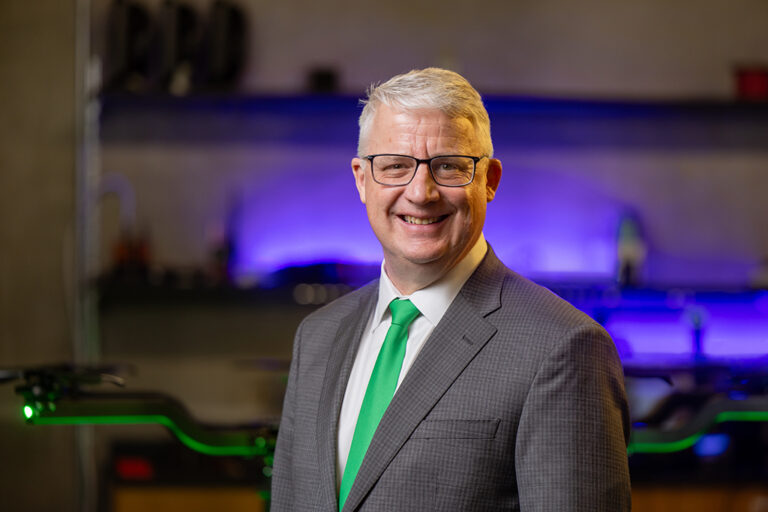Power to the pedal
Not your grandfather’s Duracell: revolutionary UND-developed battery propels everything from e-bikes to fish finders

Sometimes you need a little boost.
When Clean Republic, a Grand Forks business started by three UND students, began manufacturing their Hill Topper electric bicycle wheels, they realized the batteries used to propel the e-bikes left a little something to be desired.
They needed more oomph.
Enter UND Institute for Energy Studies.
And North Dakota coal.
UND researchers and students are exploring the use of leonardite from North Dakota lignite coal as a cathode material for a rechargeable super-battery that lasts longer and is more reliable, especially in cold temperatures. Plus, it costs less. Leonardite is a byproduct of lignite named after A.G. Leonard, the first state geologist and professor of geology at UND, for whom Leonard Hall is named.
Today, the lithium battery powers products from e-bikes to fish finders, and you can find Dakota Lithium batteries – made right in Grand Forks – on sporting equipment at Cabela’s and other retailers.
From prototype to pilot to the private sector, it’s an example of UND research that improves technology, uses North Dakota coal products, and powers jobs right here in Grand Forks, said Mike Mann, Chester Fritz Distinguished Professor and executive director of the Institute for Energy Studies.
“We started the battery development three years ago,” said Mann. “Clean Republic, which makes electric bikes, was founded by three UND graduate students 10 years ago. But the battery quality and reliability were poor, and they asked us to design and make a new battery that was higher quality, more reliable and less expensive.”

Big picture
They did. The Dakota Lithium 12-volt batteries last four times as long as regular batteries, yet weigh less.
“This is a farsighted project,” said Yong Hou, materials research engineer at the UND Institute of Energy Studies, an adjunct faculty member, and co-founder of Clean Republic. “This is so successful.”
The big picture, said Yong, is that a private company brings its problem to UND, and UND expertise, with support from public and private sources, finds new ways to use North Dakota resources and builds jobs in the state. Plus, UND co-owns the intellectual property.
That’s just one way that UND’s goal of being the chief opportunity engine and the Strategic Plan are fulfilling Goal 4, delivering opportunity by diversifying North Dakota’s economy through cutting-edge research.
“We started with one undergraduate student testing our ideas, and we figured out a possible solution,” said Xiaodong Hou, an analytical chemist and manager of the Material Characterization Laboratory (MCL) and Environmental Analytical Research Laboratory (EARL) at UND’s Institute for Energy Studies. “After a year of promising results, we wrote proposals and received a grant from Research ND to commercialize the product and helped Clean Republic bring in $1.6 million from a private investment firm.”
That led to setting up a pilot plant to produce the batteries.
“We increased the performance of the battery by 15 percent, making a super battery,” said Mann. “It’s the same size with more power, longer life and a lower cost.”
Taking care of business
Clean Republic, which was founded in 2010, manufactures and sells conversion kits for bicycles that turn them into e-bikes, which help riders maintain speed, boost pedaling, and even propel the bicycles. The kits can be installed in just a few minutes. The kits and batteries are built in Grand Forks, and Clean Republic expanded to Seattle after co-founder and UND Aviation alum Michael Shope moved back to his hometown.
Now, the UND team is working on a second project with Clean Republic and funding from the Renewable Energy Program and the North Dakota Industrial Commission.
“This is a great example of how the University works with small business,” said Xiaodong. “We were able to turn a small project into a big project, and a small business can help grow research at UND.”
Today, Clean Republic’s biggest problem is manufacturing the batteries and e-bike kits quickly enough.
“Our future depends on a successful business in Grand Forks,” said Yong. “We generate revenue and jobs for UND students, who can find a career with us as the business grows.”


